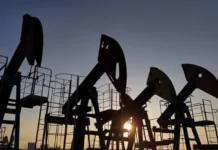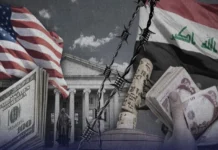2025 Strong National Economy And Sound Banks
Samir Al-Nusairi In an important presentation before the MERI Conference on Economic, Financial and Banking Reform, the Governor of the Central Bank, Mr. Ali Mohsen Al-Alaq, explained the indicators of the recovery of our national economy and the major transformations in the structure of government and private banks achieved in 2023 and 2024 and expected in 2025.
These are standard indicators that are relied upon to evaluate the strength of the economy and the soundness of the banking sector.
The most prominent of these indicators are the sufficiency of foreign cash reserves, the local currency issued, the inflation rate and the external debt, while emphasizing that the objectives of the monetary policy of the Central Bank stipulated in its applicable law are to achieve economic growth and stability,
and that one of its main objectives is to achieve stability in the financial and monetary system, reduce inflation rates and stabilize the prices of goods and services in extremely complex economic, security and political conditions that Iraq suffered from in 2023 and 2024 and that the world is currently going through, especially the countries of the geographical region, which our country is negatively and positively affected by.
These conditions have been suffered by our economy for decades, and the reason is the rentier economy and the dependence of 95% of the general budget revenues on oil, which constitutes approximately 60% of the gross domestic product.
The government is making clear efforts to revolutionize the active economic sectors, namely agriculture, industry, tourism, customs and tax services fees, and to increase their share in the general budget revenues to 20%.
The low contribution of these sectors to the gross domestic product has led to the absence of local production that covers the consumption needs of citizens for food and other basic materials.
Therefore, there was almost complete dependence on imports for the private commercial sector from different sources. Successive governments were unable to control internal trade and regulate foreign trade, and the weak control over illegal trade and unofficial border crossings, which led to the impact on the monetary and commercial market.
Therefore, this indicator was the most prominent challenge facing monetary policy and directly affected the stability of the exchange rate, which led the Central Bank to take many measures in cooperation with the government to regulate foreign trade, control foreign transfers, regularity in the global financial and banking system, compliance with international standards, digital transformation in the banking sector, and work on preparing and launching its new strategy for banking reform
and classification in all its basic links at the level of internal and external banking transactions, the most prominent of which is securing the US dollar for major and registered traders and for every trader, regardless of his classification, at the official price exclusively through the electronic platform.
This was achieved through analyzing the indicators of the annual inflation rate, which amounted to 3.8% after it was 4.4%, and by comparing it with the annual inflation rates of regional and neighboring countries. Inflation rates in most of these countries reached very high rates, reaching 80.2% in Turkey, 117.4% in Sudan, 40.0% in Iran, and in the Maghreb countries with relative economic stability in Tunisia 9.3%, Algeria 9.0%, Morocco 5.0%, and in Egypt 37.4%, and in the Gulf countries with stable and oil-rich economies, they ranged between 2.4% and 4.8%.
This confirms, without a doubt, that the strategy of the Central Bank and its procedures during the years 2023 and 2024 achieved one of the basic objectives of monetary policy, which is to reduce the inflation rate and maintain the general level of prices of goods and services.
It is currently working to achieve other objectives, which are the stability of the exchange rate and maintaining a foreign reserve that covers the local currency in circulation and imports, which exceeded $100 billion, with a sufficiency of 140%, which covers the local currency in circulation.
Therefore, the economic results and outputs confirm that the policies and procedures undertaken by the Central Bank in cooperation with the government have achieved an important objective of monetary policy, to achieve stability in the monetary system, which is an important step in achieving the other objectives of monetary policy.
It must be noted that one of the most prominent indicators of the strength and recovery of our economy is what the International Monetary Fund recently predicted, that the expected economic growth rate in 2025 will be 5.3%, while it contracted by 2.2% in 2022.
The expected rate is higher than the growth rates in Morocco, Kuwait, Bahrain, Oman, Algeria, Jordan and Qatar. It is an indicator of the strength of our economy and is an inevitable result of the economic and financial reform programs implemented by the government and the Central Bank since 2023. https://economy-news.net/content.php?id=49540
Iraq’s Gold Holdings Rise To More Than 152.5 Tons
Money and business Economy News – Baghdad The World Gold Council announced today, Wednesday, that Iraq has increased its gold holdings to more than 152.5 tons.
According to the latest table published by the Council for November 2024, which was reviewed by “Al-Eqtisad News”, “Iraq ranked 29th out of 100 countries listed in the table with the largest gold reserves,” indicating that “Iraq ranked third in the Arab world after Saudi Arabia and Lebanon.”
He added, “Iraq increased its gold holdings to 152.6 tons, after it had held 152.5 tons, which represents 11.5% of its remaining reserves.”
The Council also pointed out that “the United States of America tops the list of countries with the largest gold holdings in the world, with 8,133.5 thousand tons, followed by Germany with 3,351.5 thousand tons, then Italy with 2,814 thousand tons, while Bosnia and Herzegovina came in last with 1.5 thousand tons.”
The World Gold Council is headquartered in the United Kingdom, has extensive experience and in-depth knowledge of the factors that drive market change, and its members consist of the world’s largest and most advanced gold mining companies. https://economy-news.net/content.php?id=49544
Iraq’s Share In The IMF
Economic 2024/11/06 When Iraq announced that it had paid off all its debts to the International Monetary Fund last May, Reuters quoted the Fund as saying that Iraq was facing internal imbalances exacerbated by the large financial expansion and the decline in oil prices, and that it needed to gradually correct the public finances to achieve debt stability in the medium term and rebuild reserves.
Mohammed Sharif Abu Maysam At the same time, despite the expansion in public finance management with the aim of achieving significant increases in growth rates, the Ministry of Planning announced a decline in inflation rates from 7.5 percent to 4 percent, which is a positive precedent that has never happened before and is credited to those in charge of monetary and financial policies. It was leaked from the Central Bank that the cash reserve exceeds 110 billion dollars and that the country’s gold reserves amounted to nearly 150 tons.
The full repayment of the country’s debt to the International Monetary Fund, the decline in the inflation rate and the increase in the cash reserve rates were indicators of a major shift in economic policies, not because the amount of debt was large, exceeding about eight billion dollars, but because such debts are usually conditional in the context of the so-called economic reform program that aims to privatize state functions and link the country’s fate to the policies of the creditor parties and those behind them.
It is known globally that governments that can get rid of the burden of debt to the Fund and the World Bank are the most successful in managing the affairs of their countries and implementing their programs related to supporting macroeconomic stability and implementing the necessary financial reforms.
Supporting the ration card program was not only a direct reason for reducing inflation rates, but other factors related to monetary and financial policies and limiting parallel markets, and the flow of foreign currency with supporting the local product contributed to achieving this.
Thus, increasing the percentage of the country’s gold reserves contributed as a tool to cover the local currency and a safe means of hedging against economic fluctuations and security tensions witnessed by the world and the region.
Accordingly, those in charge of economic policy files prove their success, and it is our duty to point out that these successes, just as it was our duty to always point out the points of weakness and stumbling with the aim of monitoring and correcting, have proven the inaccuracy of the vision presented by the International Monetary Fund regarding the situation of public finances, debts, and rebuilding reserves.
Today, Iraq intends to increase its share in the International Monetary Fund by the equivalent of 1.45 trillion dinars, which will support its voting power within the Fund, contribute to attracting investments, create a promising business environment, and achieve real development, thus addressing the problem of inflation in the labor market and implementing the components of the government program. https://alsabaah.iq/105468-.html
Iraqi Drilling: Drilling And Rehabilitating 15 Oil Wells In October To Boost Production
Posted on 2024-11-06 by sotaliraq The Iraqi Drilling Company, affiliated with the Ministry of Oil, has achieved remarkable progress in its operational projects in the Iraqi oil fields, as it announced its success in drilling and reclaiming 15 oil wells during last October.
These achievements come as part of the Ministry’s strategy to enhance oil production and increase the capacity of Iraqi fields, which contributes to supporting the national economy and meeting the growing needs of the local and international market.
Economic expert, Mohammed Samir Al-Kubaisi, explained “the importance of this progress in drilling and reclaiming oil wells,” noting that “it reflects Iraq’s commitment to developing its oil infrastructure and increasing its production to enhance its financial returns.”
He stressed that “these steps support economic stability and contribute to reducing dependence on imports, which strengthens Iraq’s position as a major source in the global energy market.”
He added that “increasing production would improve public revenues, which could be directed to development projects that contribute to improving services and strengthening the local economy.”
The Deputy Director General of the Iraqi Drilling Company, Kazem Habash Khalif, said in a statement that “the technical and engineering staff in the company were able to drill 4 new oil wells and reclaim 11 other wells, distributed across several oil fields in the country.
He added, “These achievements come within the framework of the company’s commitment to enhancing oil production and adhering to the specified timetables.”
He stressed that “the company is continuing to implement its ambitious plans to enhance the oil sector in Iraq in cooperation with national and international oil companies.”
On the other hand, the Undersecretary of the Ministry for Gas Affairs, Ezzat Saber Ismail, confirmed that “the gas sector is receiving the attention of the government and the ministry,” noting that “the ministry’s strategy and plans aim to stop gas flaring within the next few years.”
The Undersecretary pointed out that “the ministry has contracted with specialized companies to invest in associated gas and convert it into energy that can be used to secure fuel for the electricity sector and develop industries in the field of petrochemicals and other industries,” explaining that “the ministry has achieved an investment rate of (67%) of gas, reaching (70%) by the end of this year.”
It is hoped, as part of future plans, that “new quantities will be added during the coming year.” LINK






